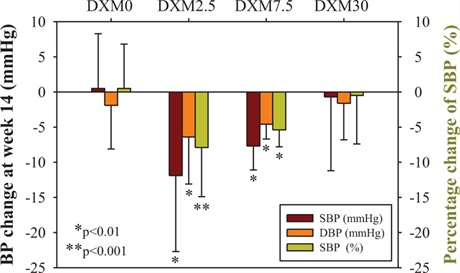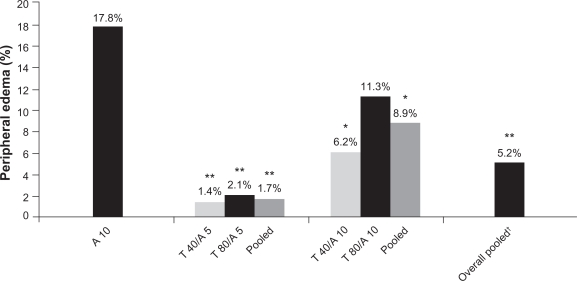Telmisartan is in the same family as losartan. It has a half life of 24 hours, versus about 9 for losartan. Telmisartan used to be expensive. But its patent expired in 2014, so now affordable.
Those who are taking amlodipine could try the hack below.
Blood Pressure Changes
In the DXM0 [dextrometorphan] group (n = 31), the mean SBP was 127.2 ± 6.9 mmHg at week 2, which remained stable with AM 5 mg daily through the end of the study. In the DXM2.5 group (n = 16), SBP reduced significantly and constantly from baseline. The reductions were 14.0 ± 8.1 mmHg (P < 0.001), 9.4 ± 12.1 mmHg (P = 0.007), and 11.9 ± 10.8 mmHg (P = 0.003) at week 6, 10, and 14, respectively. In the DXM7.5 group (n = 6), SBP was constantly reduced from baseline by 10.8 ± 10.2 mmHg (P = 0.049) and 7.7 ± 3.4 mmHg (P = 0.003) at week 10 and week 14, respectively. In DXM30 group (n = 25), there was no change in mean SBP from baseline to the end of the study.
2.5 mg is less than ten percent of the DXM dose for cough (30 mg); and that is a daily dose, compared to the four times a day dose for cough. So the daily dose is 2.5% of the dose for cough (120 mg).
Sample size is small - 103 patients.
DXM is also a NADPH oxidase inhibitor. So it may have longevity benefits.
A 2016 paper by a Taiwanese team, almost never cited… Has this finding been reproduced?
Also: why the higher the DXM dose the lower the blood pressure lowering effect?!

Has this finding been reproduced?
None that I have found by searching. There seems to be few human studies on DXM, maybe because there is no money in it. It is an old drug. So patent must have expired.
Below is a human study on another possible application.
https://tvst.arvojournals.org/article.aspx?articleid=2718716
Also: why the higher the DXM dose the lower the blood pressure lowering effect?!
Not being a scientist, am not qualified to answer that question. Neither have I found the answer by searching.
I also have a white coat syndrome and my BP goes up much if I’m having a procedure done. And no medication can quickly correct it. Even clonidine fails. My endoscopy was canceled because of that. Other than that, my BP is usually normal and on a lower side. Stress is a killer!
There’s actually a lot of money put on DXM combinations with other drugs (for instance DXM and bupropion, Auvelity, for depression). And many generics are still widely studied (for instance statins and sartans). So in the absence of independent replication AND as we have many proven safe affordable alternatives I would avoid DXM for BP lowering.
@JuanDaw
I find that amlodipine at 10 mg, combined with 100 mg of losartan, effectively controls my BP. The problem for me with amlodipine is pedema, or swelling of the feet.
Ask your cardiologist if you can decrease amlodipine to 2.5 mg: the edema should disappear (it is a dose-dependent effect, really common at 10 mg). To make sure your BP is still control, add a thiazide or thiazide-like diuretic like HCTZ (I forgot what the lowest dose is) or indapamide 1.5 mg SR.
@adssx
Amlodipine is both dose-dependent and time-dependent. I’ve been on it for five years and the pedema appeared only recently. My nephrologist did suggest a diuretic. Maybe I’ll try a three-pronged attack: losartan, amlodipine, and a diuretic in appropriate dosages.
Do you have sources saying that the side effects are time dependent?
(btw, for more BP lowering, replace losartan with telmisartan or olmesartan)
Use of amlodipine longer than 5 years was 21.65 (confidence interval [CI] = 9.575-48.970, P ˂ .001) times more likely to exhibit pedal edema;
Thanks. Research from the great Kathmandu hospital (![]() ): goes to the trash for me, unless confirmed by other papers. It’s especially weird that they follow people other 7 months but conclude about treatment for 5 years.
): goes to the trash for me, unless confirmed by other papers. It’s especially weird that they follow people other 7 months but conclude about treatment for 5 years.
This other paper mentions increase up to 6 months but it’s unclear whether they looked at more than 6 months or not: Peripheral edema associated with calcium channel blockers: incidence and withdrawal rate--a meta-analysis of randomized trials - PubMed
Here it says that one third of cases are actually not due to amlodipine: Peripheral edema and headache associated with amlodipine tre... : Journal of Hypertension
This paper confirms that combining amlodipine with telmisartan and HCTZ reduces the incidence of edema: https://onlinelibrary.wiley.com/doi/10.1111/jch.14436
According to the Mayo Clinic, amlodipine cessation must be conducted gradually or the BP could return worse than before. It’s like prednisone withdrawal. I had never heard that from either of my two physicians.
Yes that’s why you need to see with your doctor if you can reduce the amlodipine dose AND add a thiazide/thiazide-like diuretic.
I’m on 2.5 mg amlodipine for years. Even with my transplanted kidney I don’t have any side effects. In combination with a low dose beta blocker and a low dose of telmisartan it works very well.
Yes, a lower amlodipine dose and telmisartan combination divides the risk by more than 10:

Source: Clinical utility of fixed-combination telmisartan-amlodipine in the treatment of hypertension 2011
The above is for amlodipine 5 mg. Here’s the FDA file:
I couldn’t find data on amlodipine 2.5 mg + telmisartan 40 mg. I would assume, based on the above two data sources, that the rate of edema for that combination would probably be similar to placebo (0.6%) as 1.8% * (6.2%/17.8%) = 0.6%. (Explanation: [Rate for 2.5 mg amlodipine monotherapy] * ([Rate for amlodipine 10 mg + telmisartan 40 mg combination] / [Rate for amlodipine 10 mg monotherapy].)
Low dose of all medications that I take, even low dose rapamycin, seem to work very well for me.
Me too! Moderation in all things…now if I could just teach my inflammatory system that…and maybe a few other systems, too (glucose, I’m looking at you!).
Can’t remember - did you engage in the Acarbose and Akkermansia thread(s)? Might be helpful re glucose.
